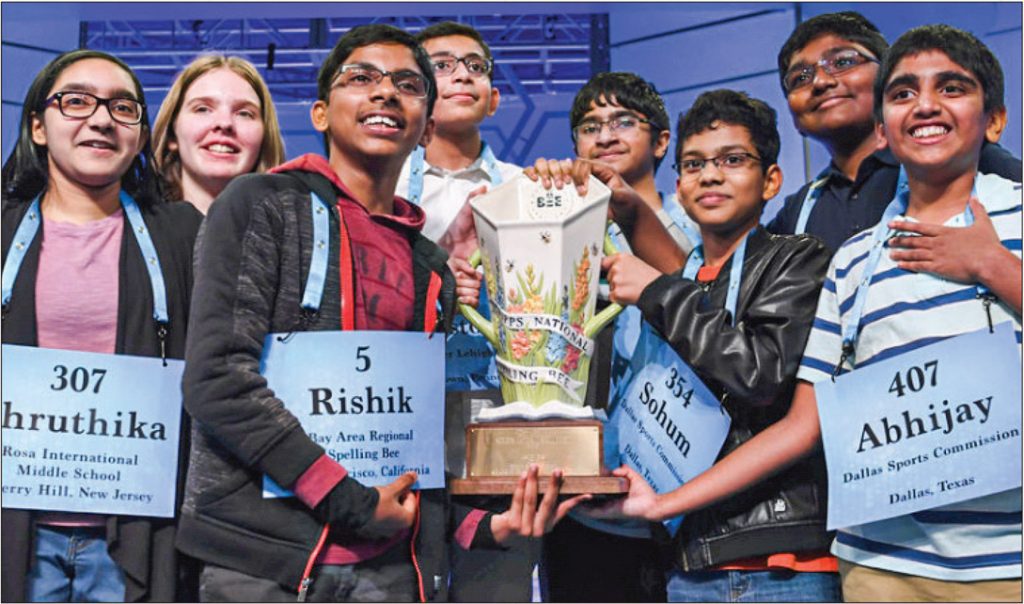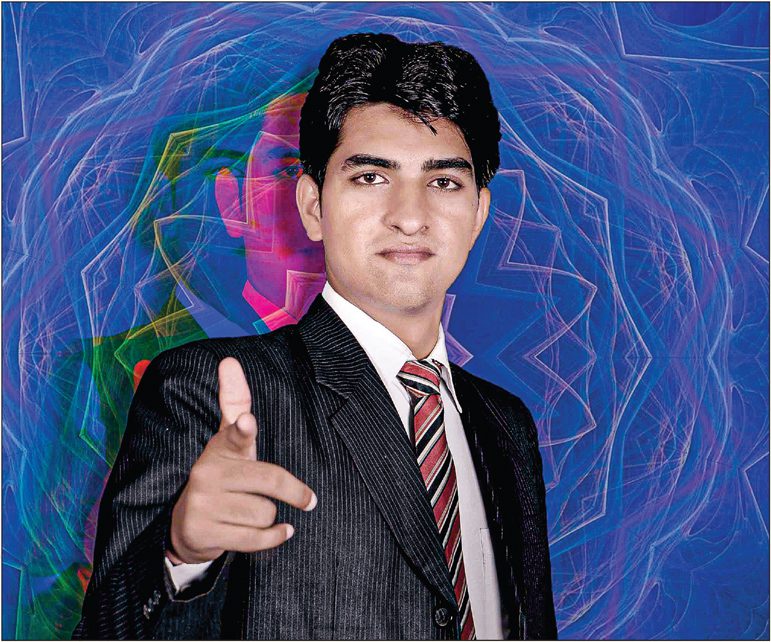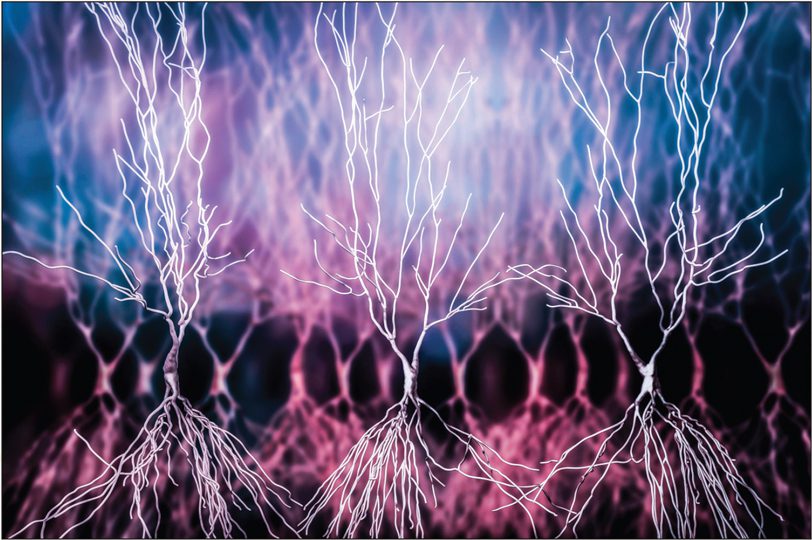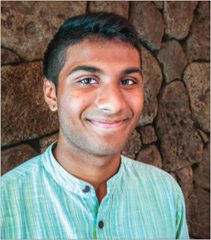Our teenage correspondent explores the extremes of the human ability to remember, finding that some of the greatest accomplishments may belong to India
BY MAYURESH VISSWANATHAN, CALIFORNIA
MEMORY IS AMONG THE MOST POWERFUL attributes of mankind. It is the sum of all experiences, knowledge and habits that we possess. It is what allows us to do something as simple as tying a shoe or as complex and astonishing as accurately chanting long sections of scripture. Memory allows extraordinary people to speak fluently in dozens of languages and recall tens of thousands of digits, words, routes, names, and much more with perfect accuracy. It also provides the enduring structure that allows for individual and cultural history and identity. From ancient times, humanity has performed mind-boggling feats of memory that continue to expand the known boundaries of the human brain.
Historically, one of the most impressive feats involving long-term memory is the oral recitation of the Vedas.This central scripture of Hinduism comprises four main parts, namely: Rig Veda, Atharva Veda, Yajur Veda, and Sama Veda, each consisting of 40,000 to 100,000 words. Before the Veda was written down, it was passed orally from generation to generation.
In most cultures that rely on oral traditions, the content tends to change slightly through each generation. This becomes obvious only when there are multiple variations in existence. In order to ensure that the Veda would remain unchanged during oral transmission from one generation to the next, strict systems of teaching the Vedawere created, including remembering the full text.
In ancient India, many male children went to a gurukula, an ancient form of schooling in which students live on the same premises as their guru, or teacher. The schools were commonly located in secluded, pastoral areas, rather than in large villages or cities with worldly distractions. Students began formal education at the age of five, living primarily at the gurukula until their late teen or early adult years. To retain the child’s focus, contact with parents was limited. Students were required to perform both physical and mental tasks as part of their daily curriculum.
Learning the Veda was a core part of education in those days. It could take up to 12 years to master just one of the four Vedas, so students spent many hours a day reciting and memorizing. Accuracy was taken seriously. These same techniques are being used in India to memorize the Veda even today, though societal investment in the importance of this study has diminished greatly over the centuries. (www.quora.com/Before-the-Vedas … n-how-were-they-memorised)
James Hartzell, a researcher from Basque Center on Cognition, Brain and Language, studied professionally trained Sanskrit pandits. While observing the pandits perform a recitation, he noted that if one of them made a mistake, they all stopped. They would restart the entire recitation, repeating it from the beginning. In this way, it was ensured that the verses in the Vedas are passed down with maximum accuracy. Hartzell’s 2016 study (blogs.scientificamerican.com/observations/a-neuroscientist-explores-the-sanskrit-effect/) revealed the amazing effects such memorization had on the pandits’ brains. On average, the brains of the pandits had ten percent more mass than the control group, who were otherwise comparable in gender, age and other factors. The extra mass was due to increased thickness of the temporal cortex region and the right hippocampus. The right hippocampus is responsible for memory of auditory and visual patterns, and the temporal cortex is responsible for speech, speech rhythm and voice recognition. Increased thickness in these areas correlates with enhancement of these functions. This is understandable, considering that the pandits spent years mastering the auditory imprinting of the Vedas. Although the brain isn’t anatomically a muscle, it could presumably have been prompted to grow as an effect of the rigorous mental exertion practiced over many years. One of the brain’s abilities, known as neuroplasticity, describes a process in which existing neurons “sprout” new dendrites and form new synapses, causing the brain to increase in size. It is theorized that as the priests perform their intensive memorization, they provoke increased neuroplasticity and their brains therefore exhibit increased thickness in certain areas.


Dominating the US Spelling Bee
Fast forward to the 21st century. Some of the most popular showcases of memory in modern day include spelling bees. The Scripps National Spelling Bee is an American event in which over ten million young children, ages up to 15, compete in spelling some of the most difficult words in the English language. Winning words are uncommon and considered difficult by even the most educated. This year’s winning words included: erysipelas, bougainvillea, aiguillette, pendeloque, cernuous and odylic. In order to prepare for these intense contests, the children study for hours every day, developing mental discipline to master the spelling of tens of thousands of words. In addition to pure memorization, they study the structure and source of words, such as nunatak’s roots in the Inuit language. Though only one percent of Americans are of Indian heritage, kids of Indian descent have dominated the contest, winning 18 of the last 21 contests. This year, seven of the eight co-champions hailed from Indian families! (www.cbsnews.com/news/breaking- … s-dominate-spelling-bees/)
3.141592653589793238462…
The memorization of digits of pi is a stunning modern display of memory’s raw power. The top two official record holders recited pi around 70,000 digits from memory without error, and there are unofficial accounts of people reciting over 100,000 digits of pi. This task requires near superhuman skill. Guinness rules require that competitors spend no more than 15 seconds between two digits, and their digit count stops at the first error. There are no lunch breaks or toilet breaks during what can be a 10- or 12-hour ordeal. The current Guinness world record holder, Rajveer Meena, took around 10 hours to accurately recite 70,000 digits. It took Chao Lu, a previous record holder, 24 hours to recite 67,890 digits. The ability to accurately recall from memory tens of thousands of digits, even after many hours of hunger and exhaustion, is spectacular.
To perform this feat, many competitors use traditional memory techniques. Among the most common is spatial visualization. Applying this method here, participants assign three or more numbers to an object—perhaps an apple, glass of water, light switch, chair or horse. Often using flashcards and recitation, they spend hours each day memorizing the numbers that are assigned to each object. Next they create a story out of the many objects, thus linking number series together in proper sequence. As they go through the story in their mind and observe the objects, they are able to recite the numbers they associated with each item. (www.livescience.com/50134-pi-day-memory-experts.html)
A surprising percentage of world memorization record setters are of Asian heritage (see the Pi World Ranking List above). This is probably not due to genetic predisposition, though some have argued that thousands of years of selection for Vedic memory skills in India may have resulted in unique abilities. Many who have won the spelling bees and set world memory records are not geniuses and do not have innately strong memory. Psychology professor Anders Ericsson of Florida State University analyzed the performance of Guinness record holder Chao Lu, who accurately recited 67,890 digits of pi. Ericsson found that Lu’s digit span—the number of digits one can recite without stopping—was relatively short, at only 8.83, while the average digit span of the group was 9.27. Researchers concluded that Lu did not have a genetically gifted memory, but rather had to work extremely hard to develop his memory prowess.






Professor Ericsson has mentioned that even normal people can accomplish these feats, but they must dedicate years to master such long streams of data. Through many hours of blood, sweat and tears, some people do sacrifice years to strengthen their memory to an elite level. In the documentary “Breaking the Bee,” an Indian spelling bee competitor asserts that their success could be attributed to “90 percent hard work, 10 percent other.” This is similar to an athlete who aspires to compete at the highest professional level. The genetic capability of the athlete only gives him a marginal advantage over other competitors who have risen to the elite level through hard work, sacrifice and dedication. Even the most genetically endowed individuals must work as hard as they can in order to make it to the highest level.
UK Cabbies
London taxicab drivers provide a compelling example improving memory through hard work. London, founded in 50 ce, has been a highly populated area for much of its colorful history. Its roads are convoluted. The city was not set up in a grid-like fashion like most, but evolved organically. The roads are intricate, narrow, winding, and have been compared to a bowl of noodles: the bowl is London and the noodles are the meandering streets that intertwine within it. Cab drivers must pass an exam that tests them on thousands of roads and locations. Studying for this exam, which qualifies them as a licensed cabbie, typically requires three to four years (though this test is less critical in the age of Uber and Google Maps). In a study from University College London Institute of Neurology, published in the peer-reviewed scientific journal Current Biology, researchers mapped the brains of London taxicab drivers who passed the exam and those who failed. All were of average IQ. The subjects that did not pass displayed no increase in grey matter in the brain over their years of study. However, subjects who did pass showed a significant increase in grey matter. Most of the brain changes were located in the hippocampus. Predictably, the hippocampus (we each have two, one on either side of the brain) is mainly responsible for long-term memory and spatial navigation. The researchers concluded that certain conditions can induce the growth of brain matter, contributing to the idea that nurture may support the development of greater memory than what nature genetically bestows on us. Turns out, London cabbies have, on average, the largest hippocampi of us all. (www.wired.com/2011/12/london-taxi-driver-memory/)
Unforgettable
We all know about photographic memory, which is image recall in excruciating detail. See something once, and remember it forever. Another form of exceptional memory—very rare, with only six known cases—is called hyperthymesia. Those with this ability can recall events and details from almost every day of their life. They can remember who won the 1992 World Series or what was in the headlines on June 20, 1978—even what the weather was like that day and what they were wearing. There are also musical savants who can hear a full concerto once and play it back, note for note. Tony DeBlois can play over 8,000 musical works from memory. And, of course, there are the World Memory Championships, the Extreme Memory Tournament, the Grand Master of Memory and more that we can’t recall just now.
Keeping Memory Strong
Often people look for simple ways to enhance their memory, or for ways to avoid crippling brain diseases. One of the lead researchers in understanding and treating Alzheimer’s disease is Dr. Rudolph Tanzi, Professor of Neurology at Harvard Medical School and Co-Director of the MassGeneral Institute for Neurodegenerative Disease at Massachusetts General Hospital. According to Dr. Tanzi, there are many ways one can enhance memory and delay the progression of brain diseases, such as Alzheimer’s. Certain dietary supplements may help. Huperzine A, a naturally occuring compound in Huperzia serrata (a club moss used in traditional Chinese medicine) increases levels of acetylcholine, a neurotransmitter associated with memory and learning. Theoretically, increased levels of this neurotransmitter work to enhance memory and learning abilities. Many testimonials support the idea that this supplement actually works (beware of most claims). Additionally, supplements such as Percepta which, according to Dr. Tanzi, “remove the bad stuff in the brain: the pathology that accumulates with age that impairs your memory.” These supplements work to enhance the brain and rid it of pathological debris.
In the progression of Alzheimer’s, the brain loses synapses (linkages between nerve cells—in effect, memory pathways). But when we learn something new, our brain forms new synapses that are connected to older synapses, effectively reinforcing them and building up “synaptic reserve.” Hence, to prevent the progression of Alzheimer’s, it is important to continue active learning. Dr. Tanzi describes learning as “associating something new with what you already know. All learning is based on association.” Theoretically, active learning—the constant formation of new synapses—should slow the progression of the disease, since the new synapses and the reinforcement of older ones will offset the rate at which synapses are lost. Furthermore, Dr. Tanzi notes, “the more synapses you have, the more you can lose before you lose it.” In other words, if you have many synapses—memory pathways—pertaining to a particular memory, you will likely retain the ability to access that memory even if a few of those pathways are lost.
The human brain continues to showcase its talent in everyday life. Our brain helps our body to perform many voluntary and involuntary tasks, all well coordinated. We can perform amazing tasks, like the accurate memorization of thousands of words or digits, or the memorization of languages, intricate, complex maps and routes. Although not everyone has the time, will or ability to perform amazing mental feats, we can all celebrate our brains as a blessing and a direct result of a perfect wave of evolution.




